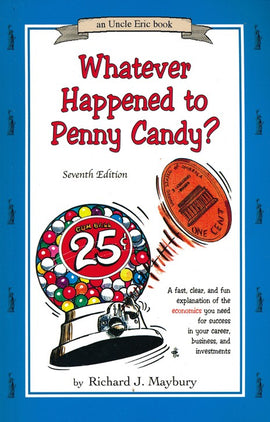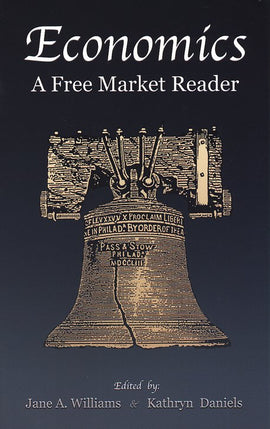The Clipper Ship Strategy
Conventional wisdom says that when the government expands the money supply, the money descends on the economy in a uniform blanket. This is incorrect. The money is injected into specific locations causing hot spots or "cones.
Mr. Maybury explains a system for tracking and profiting from these cones, for locating genuine money-making opportunities, and for avoiding those which are false or dangerous.
Includes step-by-step instructions, and clever illustrations that make the system easy to understand. Explains how to cope with recessions and avoid unemployment. This book is the second sequel to Whatever Happened to Penny Candy? and should be read after The Money Mystery.
Click here to order the corresponding study guide.
Paperback, Ages 14 through Adult.
Contents of The Clipper Ship Strategy
Part 1 - Sales Strategy
1. A Strategy for Success
2. Ethics and the Flood of Data
3. Hot Spots and Evidence
4. Austrian Economics
5. Line and Staff
6. The Clipper Ship Strategy
7. Piles of Money
8. The Money Spreads
9. Cones and Sales
10. Scooping and Pouring
11. All Roads
12. Cone Creation
13. The Super Clipper
14. Do Cones Really Exist?
15. The Biggest, Most Stable Cone
16. Accidental Cones
17. Houston: Portrait of an Accidental Cone
18. Other Accidental Cones
19. Hollow Cones
20. An Ecosystem in Chaos
21. Outside Sales
22. Benefits of This Understanding
23. Tax & Regulatory Cones
24. Marginality
25. Marketing Managers
26. The Automobile
27. How to Follow the Cones
28. A Case Study: Sacramento
29. Hot Spots and Zips
30. The Importance of a Model for Sorting Your Data
31. Cone Classification
32. Is Pinpoint Accuracy Necessary?
33. How to Classify Cones
34. Precision and Size of Firm
35. Split Cones
36. An Eerie Feeling
37. Gathering More Information
38. Specialized Organizations and Publications
39. External Information - A D.E.W. Line
40. S.I.C. Codes
41. List Companies and Marketing Data
42. Importance of Real Estate
43. Learn by Example
44. Sales Side Summary
Part 2 - Production Strategy
45. Stomping the Town
46. Your Factors of Production
47. Streamlining
48. Cyclical Problems
49. Break-Even Analysis
50. Mrs. Garcia
51. A New Industry
52. Break-Even Solutions
53. The Most Risky Investment
54. Specialization
55. Payback Analysis
56. Start-Up Firms: An Example
57. Careers in BCM
58. Investment Strategy
59. Two Types of Investment Cones
60. Summary
| Book Title | The Clipper Ship Strategy |
| Publisher: | Bluestocking Press |
| Author | Richard Maybury |
Conventional wisdom says that when the government expands the money supply, the money descends on the economy in a uniform blanket. This is incorrect. The money is injected into specific locations causing hot spots or "cones.
Mr. Maybury explains a system for tracking and profiting from these cones, for locating genuine money-making opportunities, and for avoiding those which are false or dangerous.
Includes step-by-step instructions, and clever illustrations that make the system easy to understand. Explains how to cope with recessions and avoid unemployment. This book is the second sequel to Whatever Happened to Penny Candy? and should be read after The Money Mystery.
Click here to order the corresponding study guide.
Paperback, Ages 14 through Adult.
Contents of The Clipper Ship Strategy
Part 1 - Sales Strategy
1. A Strategy for Success
2. Ethics and the Flood of Data
3. Hot Spots and Evidence
4. Austrian Economics
5. Line and Staff
6. The Clipper Ship Strategy
7. Piles of Money
8. The Money Spreads
9. Cones and Sales
10. Scooping and Pouring
11. All Roads
12. Cone Creation
13. The Super Clipper
14. Do Cones Really Exist?
15. The Biggest, Most Stable Cone
16. Accidental Cones
17. Houston: Portrait of an Accidental Cone
18. Other Accidental Cones
19. Hollow Cones
20. An Ecosystem in Chaos
21. Outside Sales
22. Benefits of This Understanding
23. Tax & Regulatory Cones
24. Marginality
25. Marketing Managers
26. The Automobile
27. How to Follow the Cones
28. A Case Study: Sacramento
29. Hot Spots and Zips
30. The Importance of a Model for Sorting Your Data
31. Cone Classification
32. Is Pinpoint Accuracy Necessary?
33. How to Classify Cones
34. Precision and Size of Firm
35. Split Cones
36. An Eerie Feeling
37. Gathering More Information
38. Specialized Organizations and Publications
39. External Information - A D.E.W. Line
40. S.I.C. Codes
41. List Companies and Marketing Data
42. Importance of Real Estate
43. Learn by Example
44. Sales Side Summary
Part 2 - Production Strategy
45. Stomping the Town
46. Your Factors of Production
47. Streamlining
48. Cyclical Problems
49. Break-Even Analysis
50. Mrs. Garcia
51. A New Industry
52. Break-Even Solutions
53. The Most Risky Investment
54. Specialization
55. Payback Analysis
56. Start-Up Firms: An Example
57. Careers in BCM
58. Investment Strategy
59. Two Types of Investment Cones
60. Summary








